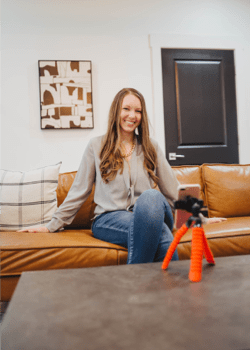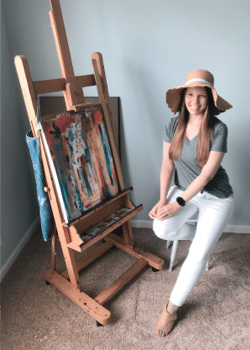A Journey with Faith, Family, and Medication
There are many paths we can chose to take when managing our skin. It's just hard figuring out which one to take sometimes. Jessica Morrison, when choosing her path, leans not only on her faith, but weighs out what is best for herself and her family.
What has Jessica's journey with TSW been?
Jessica, 31, lives in Indianapolis, IN and works as a realtor. She's also been navigating her way through topical steroid withdrawal. During the first few months of her withdrawal, it was a nightmare in an industry that needs a lot of face-to-face interaction.

"I had to soak for 2-3 hours before I could function and would pray clients would look past my very red, angry skin," Jessica shares. The insomnia, the random flares, and using social media has been difficult for her career. Being a realtor means building relationships. When you aren't able to function some days, it's hard to maintain those steady connections.
I immediately figured this was the reason Jessica decided to try an immunosuppressant. But it wasn't.
Why did she decide to try an immunosuppressant?
"The influence was less from my job and more from being a new mom," Jessica explains. She and her husband, Joshua, have a 15 month old. She became acutely aware that quality of life is paramount in order to care for their daughter. She even ponders back to the times when her husband was the backbone of their relationship.
"Thinking about what we've been through and had to do, it's truly a miracle both of us are still here."
She attests that it is through faith that they have been able to survive the worst moments. And in that faith, it was time to see if an immunosuppressant would be best. However, it wasn't a fun or easy decision.
"I chose to accept this protocol with about as much enthusiasm as I had when we had to have a cesarean over a natural birth." But she also decided to see it as a way to love the people around her, by them not having to watch her suffer.
What did she consider before taking the medication?
"I have a policy that I don't take drugs that we don't know the long-term side effects to, so I tried to take the one out of all the options the dermatologist gave me that we knew the most about," Jessica states. This is how she weeded out the newest JAK inhibitor drugs. Other things Jessica considered before taking the drug were:
- Ensuring that she didn't have an infection (fungal, bacterial, etc)
- That the doctor was thoroughly going over the medication (and not rushing her out of the room)
- Success rate
- Length of time required
- Risk of cancer and other issues/common side effects
- Cost
- What experiences others have had on the drug
- Her ability to have a child
So many considerations in place.
Jessica also emphasizes #2, being adamant that doctors do a better job during appointments. "Usually, they were very quick to just throw big drugs at me without testing and I didn't feel that was appropriate."
What did she maintain a positive mindset?
Diving deep, Jessica expresses how her faith truly made an impact on her mindset. From soaking in the written word to prayer, it gives her the strength to continue forward. She also feels having a support system around her for encouragement is key, as well as keeping healthy boundaries.

Other ways to cope are seeing a therapist, blogging, or doing things that allow you to express your emotions. "For me, that's art." Jessica also found a remedy to help with her insomnia. Despite the atrocity, she found motivation in reading about the Holocaust.
"While it was certainly horrific," she acknowledges, "what people had to go through and endure, stories like Corre ten Boom and Eva Korr were powerful and inspiring. How people chose to respond to uninvited suffering and pain, help others despite the cost to them, and even forgive their captors was helpful to understand a mental response to suffering."
What was most impactful?
But the most impactful way to cope could be becoming an advocate.
"I also got involved with advocacy," Jessica says, "because it's awful that parents are put into a position of disagreeing with a practitioner's treatment protocol and risk having CPS called if they believe their child is becoming addicted to the drugs." Sometimes, just being able to serve others is a way to serve yourself.
Overall, Jessica is very mindful of what she puts into her body and what thoughts control her mind. She will always do what is best for her family and hopes that everyone weighs the pros and cons before taking the next step with any treatment.
Join the conversation